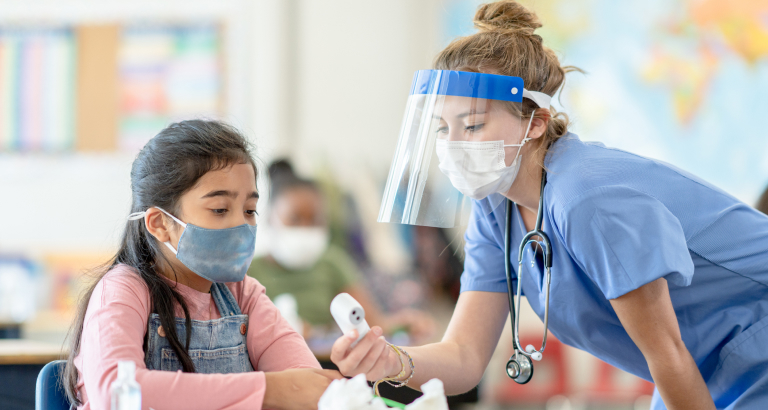Addressing child mental health in schools through school nurses

School nurses play a vital, but often undervalued part of the educational ecosystem, serving as a primary source for identifying and supporting children’s behavioral and mental health needs. However, they themselves might not have access to the resources or staff they need, leaving them feeling stressed themselves.
This is only amplified by the ongoing impacts of COVID-19, where students are now having to manage the stress, fear, and uncertainty created by the pandemic on top of interruption of school and other essential physical and social supports.
In order to help school nurses better help students navigate these issues, the School Health Institute for Education and Leadership Development (SHIELD) at the Boston University School of Public Health, launched a nine-part, multi-disciplinary series. The goal of the program is to help school health professionals view all student mental health challenges through a health equity lens, allowing them to better steer their decisions and thought processes moving forward.
SHIELD was established in 2016 to provide continuing education in the clinical, management, and leadership skills of school nurses and other school health personnel through innovative educational programs and leadership opportunities. They are funded by the Massachusetts Department of Public Health and partner with the Boston University School of Medicine Continuing Medical Education Office to deliver continuing education credits to nurses and other health professionals.
“Even before the pandemic, the mental health needs of school-aged children have been continually growing, with mental health visits accounting for a larger proportion of student encounters with school nurses and other SHPs,” said Beverly Heinze-Lacey, director of SHIELD. “As our communities navigate months of collective trauma and continue to grapple with the effects of the pandemic, this will likely increase. Now more than ever, we feel it is critical that SHPs have access to quality resources that will help them to build robust mental health supports for their school communities.”
A health equity approach
These specialized trainings are meant to provide insight into what a comprehensive school mental health support system could look like and how students of various lived experiences can result in disproportionate trauma for students and their families.
Topics covered include:
- Supporting children’s behavioral and mental health needs
- The effects of trauma on the body and behavior
- Therapeutic trauma response
- MHAP for Kids Program and the impact of school trauma response
- Mental health equity
- The comprehensive school mental health support system
- Supporting LGBTQI youth
“Every person has been affected by the COVID-19 pandemic in some way, but these burdens have not been felt equally across populations,” said Erin Sivak, nurse educator for SHIELD, who has been leading this initiative. “Our goal is to provide SHPs with the necessary skills and information to feel confident in helping students and staff work through their unique experiences and mental health concerns and to create a safe and supportive school environment for all.”
Courses are now available on-demand here. Additional resources and recordings will be released throughout the year, so be sure to check back for new lessons.




